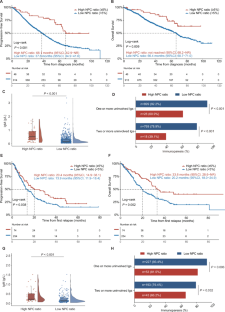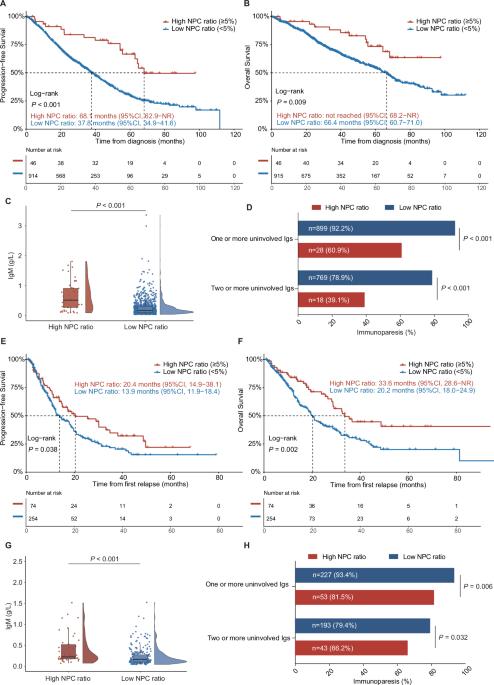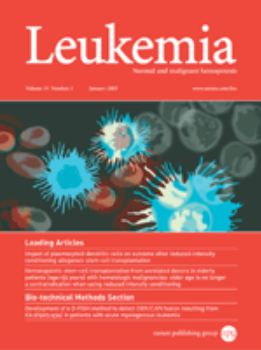Clinical implications of residual normal plasma cells within bone marrow across various disease stages in multiple myeloma
IF 12.8
1区 医学
Q1 HEMATOLOGY
引用次数: 0
Abstract
Residual normal plasma cells (NPCs), which compete with tumor plasma cells, play an important role in multiple myeloma. However, large-scale cohort studies investigating residual NPCs, especially at the minimal residual disease (MRD) phase, are currently lacking. In this study, we conducted a comprehensive investigation into the clinical significance of residual NPCs throughout the entire disease course in 1363 myeloma patients from the NICHE cohort (NCT04645199). Our results revealed that myeloma patients with high baseline NPCs ratio (≥5%) exhibited distinct indolent features, characterized by lower tumor burden, reduced frequencies of cytopenia, immunoparesis, and high-risk cytogenetics. Importantly, high residual NPCs ratio at diagnosis or relapse was independently associated with favorable survival. High absolute percentages of NPCs at undetectable MRD were related with superior clinical benefit and immune reconstitution. At MRD-positive phases, grouping based on NPCs ratio (<50%, 50–90%, ≥90%) demonstrated better risk stratification compared to residual tumor log levels. Based on the time-dependent NPCs ratio trend, we developed a dynamic MRD model that classifies patients into three groups with diverse longitudinal trends, leading to distinct prognoses. Collectively, residual NPCs serves not only as a valuable complementary biomarker for risk stratification but also provides valuable insights on reclassifications and kinetics of MRD.


多发性骨髓瘤不同疾病阶段骨髓中残留正常浆细胞的临床意义。
残留的正常浆细胞(NPC)与肿瘤浆细胞竞争,在多发性骨髓瘤中发挥着重要作用。然而,目前还缺乏大规模的队列研究来调查残留的正常浆细胞,尤其是在最小残留病(MRD)阶段。在本研究中,我们对来自 NICHE 队列(NCT04645199)的 1363 名骨髓瘤患者的整个病程中残留 NPC 的临床意义进行了全面调查。我们的研究结果显示,基线NPCs比率高(≥5%)的骨髓瘤患者表现出明显的懒散特征,其特点是肿瘤负荷较低、细胞减少、免疫排斥和高危细胞遗传学。重要的是,诊断时或复发时残留的鼻咽癌比例高与生存率高密切相关。未检测到 MRD 的 NPCs 绝对百分比高与临床获益和免疫重建的优越性有关。在 MRD 阳性阶段,根据 NPCs 比率(0.5%)分组 (
本文章由计算机程序翻译,如有差异,请以英文原文为准。
求助全文
约1分钟内获得全文
求助全文
来源期刊

Leukemia
医学-血液学
CiteScore
18.10
自引率
3.50%
发文量
270
审稿时长
3-6 weeks
期刊介绍:
Title: Leukemia
Journal Overview:
Publishes high-quality, peer-reviewed research
Covers all aspects of research and treatment of leukemia and allied diseases
Includes studies of normal hemopoiesis due to comparative relevance
Topics of Interest:
Oncogenes
Growth factors
Stem cells
Leukemia genomics
Cell cycle
Signal transduction
Molecular targets for therapy
And more
Content Types:
Original research articles
Reviews
Letters
Correspondence
Comments elaborating on significant advances and covering topical issues
 求助内容:
求助内容: 应助结果提醒方式:
应助结果提醒方式:


